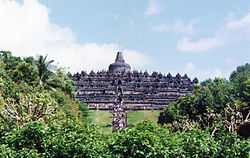Aliran kepercayaan

 Clash Royale CLAN TAG#URR8PPP
Clash Royale CLAN TAG#URR8PPP | Part of a series on |
| Religion of Java |
|---|
 |
Java Java |
Early religiosity Sunda Wiwitan |
Hinduism Hinduism in Java |
Buddhism Buddhism in Indonesia |
Islam Spread of Islam in Indonesia |
Kebatinan Kebatinan |
Christianity Christianity in Indonesia |
Aliran Kepercayaan[note 1] is an official cover term for various, partly syncretic forms of mysticism in Indonesia.[2] It includes kebatinan, kejiwan, and kerohanian.[2]
Contents
1 Characteristics
2 Recognition
3 Notes
4 References
5 Sources
6 External links
Characteristics
Kebatinan can be described as an amalgam of animist, Hindu-Buddhist, and Islamic (especially Sufi) mystical elements that combine to form Javanese mysticism. According to Caldarola, kepercayaan "is not an apt characterization of what the mystical groups have in common".[2] The US State Department's states:
.mw-parser-output .templatequoteoverflow:hidden;margin:1em 0;padding:0 40px.mw-parser-output .templatequote .templatequoteciteline-height:1.5em;text-align:left;padding-left:1.6em;margin-top:0
Sizeable populations in Java, Kalimantan, and Papua practice animism and other types of traditional belief systems termed "Aliran Kepercayaan." Many of those who practice Kepercayaan describe it as more of a meditation-based spiritual path than a religion. Some animists combine their beliefs with one of the government-recognized religions.[3]
Recognition
As a body of belief, kebatinan is officially recognized in the 1945 Indonesian constitution; however, to avoid recognizing it as a formal religion, it is administered by the Department of Education and Culture rather than by the Department of Religious Affairs. The Indonesian Government recognizes the right to follow Aliran Kepercayaan, as long as its practitioners do not upset the public order or offend the sensitivities of the followers of the major religions.
Aliran Kepercayaan has recently[when?] been rejected by the United Development Party [PPP] heterodoxy.[citation needed]
Indonesia's Constitutional Court on Nov 2017 ruled that followers of faiths outside the 6 recognized are allowed to state so on their national identity cards, as a 7th category aliran kepercayaan including Marapu religion, the Parmalim followers of Ugamo Bangsa Batak religion, and id:Sapta Darma, something that has never happened in Indonesia.[4] Nevertheless, it is unclear if Papuan religions are recognized at this point.
Notes
^ Full: Kepercayaan kepada Tuhan Yang Maha Esa,[1] "Believer of One Supreme God",[citation needed] a.k.a. Pangistu.[1]
References
^ ab Indonesia: East Java native religion called Aliran Kepercayaan or Kepercayaan Kepada Tuhan Yang Maha Esa, aka Pangistu; its status and treatment of its members by Muslim fundamentalists (2003-June 2004)[permanent dead link]
^ abc Caldarola 1982, p. 539, note 30.
^ "International Religious Freedom Report 2005 (Indonesia)"
^ http://jakartaglobe.id/news/indonesias-constitutional-court-says-yes-indigenous-faiths/
Sources
.mw-parser-output .refbeginfont-size:90%;margin-bottom:0.5em.mw-parser-output .refbegin-hanging-indents>ullist-style-type:none;margin-left:0.mw-parser-output .refbegin-hanging-indents>ul>li,.mw-parser-output .refbegin-hanging-indents>dl>ddmargin-left:0;padding-left:3.2em;text-indent:-3.2em;list-style:none.mw-parser-output .refbegin-100font-size:100%
Caldarola, Carlo (1982), Religion and Societies: Asia and the Middle East, Walter de Gruyter.mw-parser-output cite.citationfont-style:inherit.mw-parser-output qquotes:"""""""'""'".mw-parser-output code.cs1-codecolor:inherit;background:inherit;border:inherit;padding:inherit.mw-parser-output .cs1-lock-free abackground:url("//upload.wikimedia.org/wikipedia/commons/thumb/6/65/Lock-green.svg/9px-Lock-green.svg.png")no-repeat;background-position:right .1em center.mw-parser-output .cs1-lock-limited a,.mw-parser-output .cs1-lock-registration abackground:url("//upload.wikimedia.org/wikipedia/commons/thumb/d/d6/Lock-gray-alt-2.svg/9px-Lock-gray-alt-2.svg.png")no-repeat;background-position:right .1em center.mw-parser-output .cs1-lock-subscription abackground:url("//upload.wikimedia.org/wikipedia/commons/thumb/a/aa/Lock-red-alt-2.svg/9px-Lock-red-alt-2.svg.png")no-repeat;background-position:right .1em center.mw-parser-output .cs1-subscription,.mw-parser-output .cs1-registrationcolor:#555.mw-parser-output .cs1-subscription span,.mw-parser-output .cs1-registration spanborder-bottom:1px dotted;cursor:help.mw-parser-output .cs1-hidden-errordisplay:none;font-size:100%.mw-parser-output .cs1-visible-errorfont-size:100%.mw-parser-output .cs1-subscription,.mw-parser-output .cs1-registration,.mw-parser-output .cs1-formatfont-size:95%.mw-parser-output .cs1-kern-left,.mw-parser-output .cs1-kern-wl-leftpadding-left:0.2em.mw-parser-output .cs1-kern-right,.mw-parser-output .cs1-kern-wl-rightpadding-right:0.2em
External links
- Article on Indonesia People's Consultative Assembly (MPR)
This Indonesia-related article is a stub. You can help Wikipedia by expanding it. |